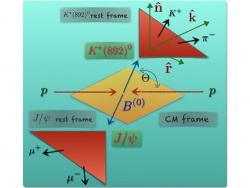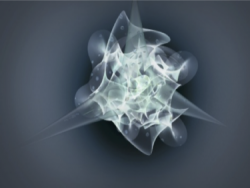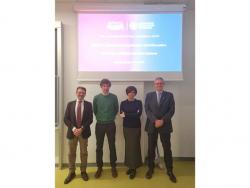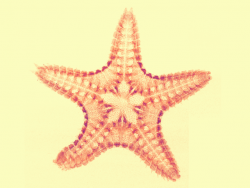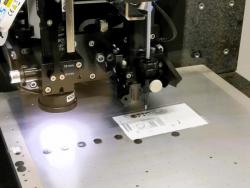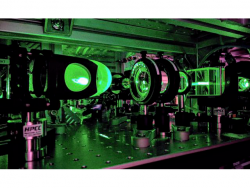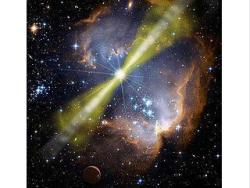- Home
- Department
- Research
- Teaching
- Post Graduate Studies
- Knowledge Transfer
- How To
EUCLID, the Dark Universe Mission
Research Strand:
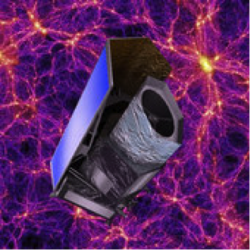 Euclid is an ESA medium class astronomy and astrophysics space mission selected in 2011 aimed at investigating the nature of dark matter and dark energy. The mission will be launched in 2020 on a Soyuz vehicle from Europe's Spaceport at Kourou, French Guiana, and will orbit around the Sun–Earth L2 point located 1.5 million km from Earth. Euclid’s nominal mission lifetime is six years. Science and spacecraft operations will be conducted by ESA.
Euclid is an ESA medium class astronomy and astrophysics space mission selected in 2011 aimed at investigating the nature of dark matter and dark energy. The mission will be launched in 2020 on a Soyuz vehicle from Europe's Spaceport at Kourou, French Guiana, and will orbit around the Sun–Earth L2 point located 1.5 million km from Earth. Euclid’s nominal mission lifetime is six years. Science and spacecraft operations will be conducted by ESA.
The Euclid mission aims at understanding why the expansion of the Universe is accelerating and what is the nature of the source responsible for this acceleration referred to as dark energy. Dark energy represents around 75% of the energy content of the Universe today, and together with dark matter it dominates the Universes’ matter-energy content. Both are mysterious and of unknown nature but control the past, present and future evolution of Universe.
Euclid will explore how the Universe evolved over the past 10 billion years to address questions related to fundamental physics and cosmology on the nature and properties of dark energy, dark matter and gravity, as well as on the physics of the early universe and the initial conditions which seed the formation of cosmic structure. The imprints of dark energy and gravity will be tracked by using two complementary cosmological probes to capture signatures of the expansion rate of the Universe and the growth of cosmic structures: Weak gravitational Lensing and Galaxy Clustering (Baryonic Acoustic Oscillations and Redshift Space Distortion).
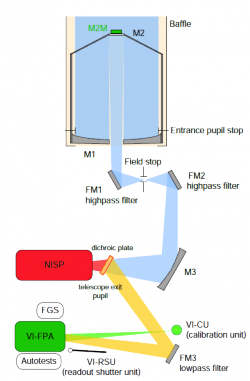 Euclid comprises a 1.2 m diameter telescope and two scientific instruments: a visible-wavelength camera (VIS - VISible imager) and a near-infrared camera/spectrometer (NISP - Near Infrared Spectrometer and Photometer).The group in Trieste in mainly involved in the science ground segment.
Euclid comprises a 1.2 m diameter telescope and two scientific instruments: a visible-wavelength camera (VIS - VISible imager) and a near-infrared camera/spectrometer (NISP - Near Infrared Spectrometer and Photometer).The group in Trieste in mainly involved in the science ground segment.
The Euclid science ground segment consists of the Science Operations Centre, located at ESA's European Space Astronomy Centre (ESAC) in Spain plus a number of Science Data Centres (SDC) and two Instrument Operation Teams (IOTs, hosted by two dedicated SDCs, in Paris and in Trieste) and provided by the Euclid Science Consortia.
The SOC will act as interface between the ESA MOC (Mission Operation Centre) and the instrument consortia, for all aspects concerning the operations (through the IOT coordinator, located in Trieste as part of the Euclid Project Office) and monitoring of the scientific instruments.
The EC is responsible of the definitions of the scientific goals, the mission concept, the science requirements and the survey. It is also in charge of the design, construction, tests, integration and delivery to ESA of the imaging and spectroscopic instruments VIS and NISP. The Euclid Consortium Science Ground Segment (EC SGS) is responsible of the design, development tests, integration and operation of the data processing tools, pipelines and data centers. It shares with the EC Science Working Groups (SWG) the responsibility of the scientific production and delivery of Euclid data releases, and their scientific analysis and interpretation.
Info
Last update: 02-17-2025 - 12:53


